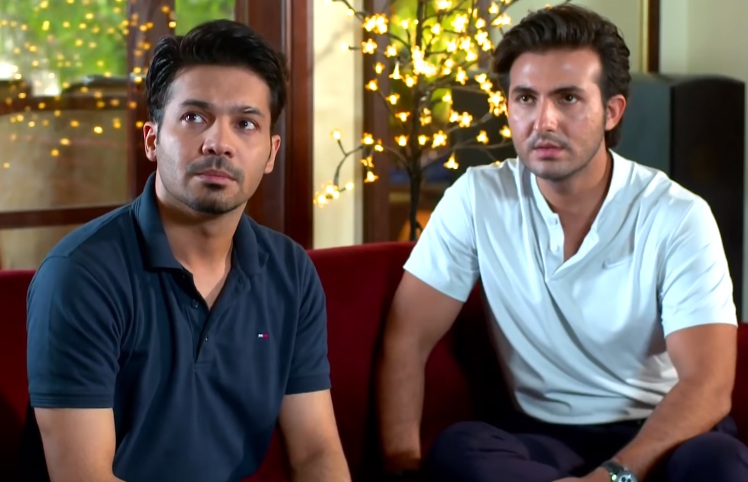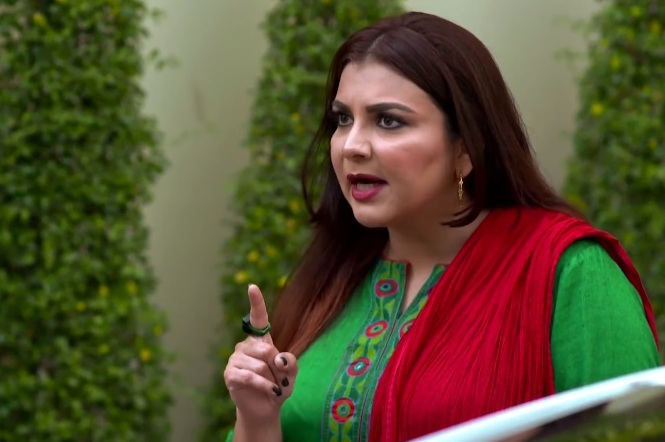ARY Digital‘s dramas are usually high on masala and Nand is no exception. Featuring Faiza Hasan, Shahroz Sabzwari, Minal Khan, Aijaz Aslam, Maha Hasan, and Ayaz Samoo in the lead, Nand tells the tale of three couples, Gohar (Hasan) and Jehangir (Aslam), Saqib (Sabzwari) and Rabi (Khan), and Hasan (Samoo) and Farwa (Maha). The main focus is the problems in Rabi and Farwa’s marital lives caused by their vile nand (sister-in-law), Gohar, who is estranged from her husband, Jehangir, and lives with her brothers.

As the main antagonist, Gohar is domineering, jealous, and unsympathetic. She is driven by an uncontrollable urge to disintegrate her brother Saqib’s marriage with Rabi, ironically a girl of her own choosing. Gohar frequently mistreats the mild and unassuming Rabi as Saqib, who prefers to appease his temperamental sister instead of supporting his wife, fails to stand by her. In a crass and rather senseless ode to Star Plus, Gohar successfully causes Rabi to miscarry by premeditating her accident.

A few episodes later, Saqib defers to Gohar in divorcing Rabi. Gohar is now eyeing the demise of her younger brother Hasan’s marriage, who married a girl he liked. Although Hasan is shown to be assertive and exercising independent judgment frequently – much to the dislike of his sister – Gohar doesn’t leave a chance to poison his relationship with his wife. However, Farwa’s no-nonsense attitude kindles hope for a better ending to her story compared to Rabi, who lets things happen to her and grieves her poor fate later.

With basic plot details out of the way, let us just say that Nand is no different than conventional Pakistani dramas in its disregard for intelligence, nuance, thoughtful writing, and the changes taking place around us that should ideally figure in our storytelling.
Read more – PEMRA ban: ‘Jalan’ to air as per schedule
The characters in Nand are unidimensional. Morality is either possessed or unpossessed, whereas the aurat aurat ki dushman trope is alive and kicking. The concept of character arcs does not exist. Hence, both good and bad characters are unhinged in their virtue and vice. We also do not know why these characters are the way they are or what experiences inform their respective outlooks on life. On the one hand, the drama’s villain, Gohar, played brilliantly by Faiza Hasan, arouses hate and disgust through her conniving ways, while on the other, her incredulous brothers (especially Saqib), are shown to be deserving of sympathy, of being let off the hook because evil Gohar incites them to do bad things. Naturally, this means that the flaws in these men’s personalities causing trouble—i.e., lack of judgment, chauvinism, and sense of entitlement—remain unaddressed. After all, what good is a vamp if the moral agency of other characters were to remain intact?

The notoriety in Nand does not end here. The drama sensationalizes domestic violence and promotes zero accountability for this wretched behavior in which siblings Gohar, Saqib, and Hasan engage against Rabi and Farwa.
Most importantly, Nand is outrageous in its portrayal of divorce and iddat. One fine day, Gohar accuses Rabi of having an affair with her husband, Jehangir. A yelling match ensues and culminates in Saqib throwing the ‘T word’ thrice towards Rabi, in a fit of rage. ‘Triple talaq’ or instant divorce is a deeply contentious issue among Muslims and does not enjoy universality – it is not as straightforward as this drama depicts it to be. In fact, the practice of ‘triple talaq’ defies common sense in that the pronouncement of divorce takes precedence over the intent to divorce. An Islamic marriage solemnizes between two sane, mentally and emotionally mature adults, who accept each other as spouses in the presence of witnesses. Apart from that, it is recommended that the rights and obligations of spouses with respect to maintenance, spending, and child-rearing be settled before a marriage takes place. How can marriage, (ideally) conducted with such elaborate procedures and planning, end at once in triple pronouncements of talaq, that too in fits of rage or humor? Why aren’t our dramas questioning this?

There is also a constant emphasis on completing the traditional three-month waiting period (iddat) by Rabi’s family before she can step out of the house, meet someone, or work. The way Rabi is kept indoors is a painful reminder of how iddat is instrumentalized to deny mobility to women, even if temporarily. In many Pakistani households, older women who are decades past their reproductive years—read ineligible for iddat—are still made to observe complete waiting periods when they are widowed or divorced. Clearly, form is privileged over substance in matters of divorce and our creative industry is just as complacent as the rest of our society.

Despite its weaknesses, some viewers may still find Nand relatable. After all, entitled, abusive in-laws and husbands, are real and cause irreparable suffering to those at the lower rung of the domestic power ladder i.e., women and children. Having said that, transgressions within the family is a deeply sensitive and serious matter. Dramas touching upon it must offer intelligent, meticulous insight into the drivers of unsavory human behaviors instead of providing black-and-white explanations. This requires understanding that good and bad are never mutually exclusive or embedded in certain human relations by default. Additionally, to blame every misfortune on the villain’s machinations creates predictability and hampers the development of other characters. Not only should our drama writers understand such nuances, but they must also cultivate more insight into the ethical implications of their work.
Nand has been written by Samina Aijaz and directed by Zeeshan Ali Zaidi.







